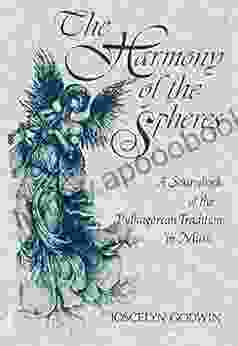Unveiling the Enigmatic Secrets of Music: The Pythagorean Tradition


4.3 out of 5
| Language | : | English |
| File size | : | 2746 KB |
| Text-to-Speech | : | Enabled |
| Screen Reader | : | Supported |
| Enhanced typesetting | : | Enabled |
| Word Wise | : | Enabled |
| Print length | : | 684 pages |
Music, with its enchanting melodies and captivating rhythms, has the power to evoke emotions, inspire creativity, and bring people together. Yet, beneath the surface of these mesmerizing sounds lies a hidden world of mathematical proportions and numerical ratios. It is in this realm that we encounter the enigmatic Pythagorean tradition, a profound philosophy that has shaped our understanding of music theory and harmony for centuries.
The Legacy of Pythagoras
Pythagoras, a renowned Greek mathematician and philosopher who lived around the 6th century BC, is widely regarded as the father of Western music theory. His fascination with numbers and their mystical properties led him to explore the mathematical relationships that govern the harmony of sound. Pythagoras believed that music, like the universe itself, is governed by mathematical principles, and that by understanding these principles, we can unlock the secrets of musical beauty.
According to the Pythagorean tradition, musical harmony is based on the ratios of small whole numbers. The most fundamental of these ratios is the octave, which occurs when the frequency of one note is exactly twice that of another. Pythagoras discovered that the octave can be subdivided into smaller intervals, such as the perfect fifth (3:2) and the perfect fourth (4:3). These intervals, when combined in specific proportions, create pleasing and harmonious sounds.
The Monochord: A Tool for Unlocking Musical Secrets
Pythagoras's exploration of musical ratios was aided by a simple device known as the monochord. This device consisted of a single string stretched over a sounding board. By adjusting the length of the string, Pythagoras could create different notes and study the intervals between them. Using the monochord, Pythagoras demonstrated that the intervals of the octave, fifth, and fourth could be expressed as simple numerical ratios.

Pythagoras's work on the monochord had a profound impact on the development of Western music theory. It established the foundation for the diatonic scale, which is still used in music today. The diatonic scale is based on a series of whole and half steps, and its intervals are derived from the Pythagorean ratios.
The Pythagorean Ethos: Music as a Reflection of the Cosmos
For Pythagoras, music was not merely a form of entertainment but a reflection of the underlying Free Download of the universe. He believed that the harmony of music mirrored the harmony of the cosmos, and that by studying music, we could gain insights into the nature of reality. Pythagoras's followers, known as the Pythagoreans, adopted this ethos and sought to apply mathematical principles to all aspects of their lives, including music, philosophy, and science.
The Pythagorean tradition emphasizes the importance of balance, proportion, and harmony in all things. This ethos is reflected in the music of the ancient Greeks, which was characterized by its clarity, simplicity, and mathematical precision. Greek musicians used Pythagorean principles to create melodies and rhythms that were both pleasing to the ear and uplifting to the soul.
The Pythagorean Legacy in Modern Music
The Pythagorean tradition continues to exert a profound influence on music theory and practice today. Many modern composers, from Johann Sebastian Bach to Arnold Schoenberg, have incorporated Pythagorean principles into their works. The 12-tone scale, which is widely used in 20th-century music, is based on the Pythagorean cycle of fifths.
Pythagorean ideas have also influenced the development of electronic music and sound synthesis. Composers such as Karlheinz Stockhausen and Iannis Xenakis have used mathematical algorithms and computer technology to explore the possibilities of sound based on Pythagorean principles.
The Pythagorean tradition in music is a testament to the enduring power of mathematics and its ability to illuminate the beauty and harmony of sound. From the ancient Greeks to modern composers, Pythagorean principles have shaped our understanding of music theory and continue to inspire musical innovation. As we delve deeper into the enigmatic secrets of music, we can uncover the profound connection between mathematics, harmony, and the human experience.
4.3 out of 5
| Language | : | English |
| File size | : | 2746 KB |
| Text-to-Speech | : | Enabled |
| Screen Reader | : | Supported |
| Enhanced typesetting | : | Enabled |
| Word Wise | : | Enabled |
| Print length | : | 684 pages |
Do you want to contribute by writing guest posts on this blog?
Please contact us and send us a resume of previous articles that you have written.
 Book
Book Novel
Novel Page
Page Chapter
Chapter Text
Text Story
Story Genre
Genre Reader
Reader Library
Library Paperback
Paperback E-book
E-book Magazine
Magazine Newspaper
Newspaper Paragraph
Paragraph Sentence
Sentence Bookmark
Bookmark Shelf
Shelf Glossary
Glossary Bibliography
Bibliography Foreword
Foreword Preface
Preface Synopsis
Synopsis Annotation
Annotation Footnote
Footnote Manuscript
Manuscript Scroll
Scroll Codex
Codex Tome
Tome Bestseller
Bestseller Classics
Classics Library card
Library card Narrative
Narrative Biography
Biography Autobiography
Autobiography Memoir
Memoir Reference
Reference Encyclopedia
Encyclopedia Matthew Wright
Matthew Wright Scott Lobdell
Scott Lobdell Teresa Torres
Teresa Torres Rachel Grant
Rachel Grant Mykola Riabchuk
Mykola Riabchuk Jorge Bendersky
Jorge Bendersky John Scalzi
John Scalzi Morgan Rice
Morgan Rice Joice Berth
Joice Berth Ruth Brunson
Ruth Brunson Reader S Aid
Reader S Aid Kat Martin
Kat Martin Nicolas Gerrier
Nicolas Gerrier Margaret A Majumdar
Margaret A Majumdar Joscelyn Godwin
Joscelyn Godwin Vaughn Rasberry
Vaughn Rasberry Josh Alan Friedman
Josh Alan Friedman Joseph A Laydon Jr
Joseph A Laydon Jr Will Schmid
Will Schmid John Mauceri
John Mauceri
Light bulbAdvertise smarter! Our strategic ad space ensures maximum exposure. Reserve your spot today!

 Robert Louis StevensonAn Oral History of the Attacks Against the Students of Ayotzinapa: A Haunting...
Robert Louis StevensonAn Oral History of the Attacks Against the Students of Ayotzinapa: A Haunting...
 Calvin FisherChildren of Migration in the European Union and the United States: Research...
Calvin FisherChildren of Migration in the European Union and the United States: Research... Ivan CoxFollow ·6.1k
Ivan CoxFollow ·6.1k Ben HayesFollow ·5.4k
Ben HayesFollow ·5.4k Henry GreenFollow ·4k
Henry GreenFollow ·4k Jason ReedFollow ·13.7k
Jason ReedFollow ·13.7k Ricky BellFollow ·11.3k
Ricky BellFollow ·11.3k Chuck MitchellFollow ·19.7k
Chuck MitchellFollow ·19.7k Forrest ReedFollow ·17.2k
Forrest ReedFollow ·17.2k Harvey HughesFollow ·8.1k
Harvey HughesFollow ·8.1k

 Tyler Nelson
Tyler NelsonHer Dragon to Slay: Embark on an Epic Journey of...
In a realm where shadows dance and legends...

 Zachary Cox
Zachary Cox101 Best Marine Invertebrates: The Adventurous Aquarist's...
Unveiling the Enchanting Realm...

 William Wordsworth
William WordsworthHer Dragon Fire: Unleash the Power Within Your Soul
Embark on an...

 William Powell
William PowellUnveiling the Enchanting World of Machine Embroidery with...
Embroidery, an ancient art form that has...

 Will Ward
Will WardGolden Fire Clan Dragon Guard: A Journey into a Realm of...
Prepare to be...

 Gustavo Cox
Gustavo CoxProject Ideas to Elevate Your Hobbies and Flourish Your...
<p>Welcome to the ultimate guide to...
4.3 out of 5
| Language | : | English |
| File size | : | 2746 KB |
| Text-to-Speech | : | Enabled |
| Screen Reader | : | Supported |
| Enhanced typesetting | : | Enabled |
| Word Wise | : | Enabled |
| Print length | : | 684 pages |








